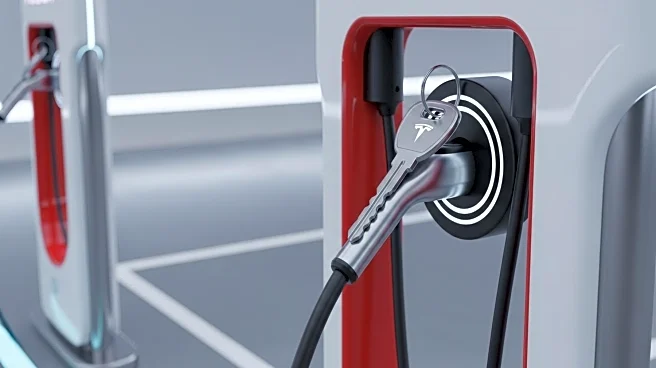What is the story about?
What's Happening?
The Trump administration is considering a new tariff relief package that would benefit automakers with significant manufacturing operations in the United States. Republican Senator Bernie Moreno has identified Tesla as one of the top five domestic producers that would be 'immune to tariffs' under the new plan. This proposal aims to extend and expand an existing tariff offset program, which provides an import adjustment offset equal to 3.75% of a vehicle's suggested retail price for eligible US-assembled vehicles through April 2026. The offset functions as a credit or rebate for automakers, calculated as 3.75% of the vehicle's MSRP, intended to cancel out tariffs paid on imported components.
Why It's Important?
The proposed tariff relief plan is designed to incentivize domestic production by rewarding automakers with final assembly operations in the US. For Tesla, which operates major facilities in Fremont and Gigafactory Texas, this policy could enhance its competitive advantage by reducing costs associated with tariffs on imported components. This would potentially increase Tesla's profitability for vehicles manufactured in the US. The plan signals a commitment to supporting domestic manufacturing, which could have broader implications for the US auto industry, encouraging more companies to establish or expand operations within the country.
What's Next?
While a final decision on the tariff relief plan has not been made, Senator Moreno believes a decision could be imminent. However, a senior White House official has cautioned that discussions remain speculative until President Trump approves the plan. If implemented, the relief could lead to increased investment in US manufacturing facilities by automakers seeking to benefit from the tariff offsets. This could also prompt other industries to lobby for similar relief measures, potentially influencing broader trade and economic policies.
Beyond the Headlines
The tariff relief plan highlights the ongoing debate over trade policies and their impact on domestic industries. It raises questions about the balance between protecting local jobs and fostering global trade relationships. The plan could also influence consumer prices, as automakers may pass on savings from tariff offsets to customers, potentially affecting market dynamics and consumer choices.
















